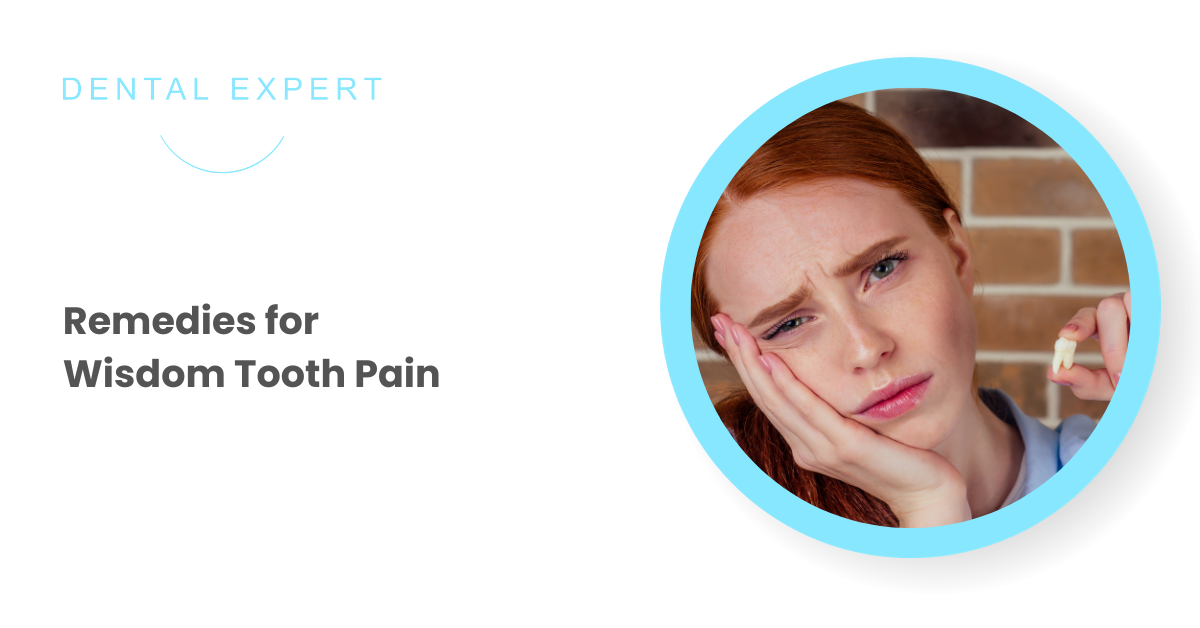Third molars, often known as wisdom teeth, typically erupt in the late teen years and early adult years. Pain from wisdom teeth is common because by the time they come in, there is typically not enough space for them to come in the correct position after all other teeth have settled in.
Problems Associated with Wisdom Tooth
Common problems with wisdom teeth include crookedness, crowding, incomplete eruption, and non-emergence. Food and bacteria can become stuck between molars that are only partially covered. Wisdom teeth pain can be caused by any of these factors. The only long-term fix is to make an appointment with the dentist to have them removed, but this isn’t always possible.
Remedies You May Try Before You Visit the Dentist
While you wait for your dentist to remove your wisdom teeth, try these wisdom tooth pain relief techniques and wisdom tooth pain unbearable home remedy options to ease your discomfort.
Analgesic Pain can be temporarily relieved with ibuprofen, a pain reliever, but you should take it only after consultation with your dentist. The throbbing sensation is often alleviated by taking ibuprofen because it works by reducing inflammation. It is a temporary help and should not be used long-term.
Please refer to the product label for recommended dosage information. Never take any drug without first discussing it with your dentist, primary care physician or pharmacist.
You can also read: Best Dental Clinic in Mumbai For International Patients
Use a Cold Compress
Wisdom teeth discomfort can be relieved by using an ice pack, a small bag of ice, or even a bag of frozen peas wrapped in a towel on the problematic area for 15–20 minutes at a time, several times a day. This method offers effective wisdom teeth pain relief by reducing the swelling around the wisdom teeth. The numbing action of ice might also aid in relieving the pain.
For the sake of preventing frostbite, it is not safe to apply ice directly to the skin, nor should it be left on for an extended period of time.
Get some numbing gel from the drug store.
If you want to numb your gums without going to the dentist, ask your doctor or pharmacist about an over-the-counter gel that contains the active ingredient benzocaine. Numbing gels typically have menthol to calm gums and an astringent to minimise gum irritation.
Several brands and generics are available without a prescription.
Use a Saltwater Gargle to Cleanse
Dissolve one or two tablespoons of salt in a glass of hot water. For one minute, concentrate on swishing the liquid around the sore spot in your mouth, and then spit it out.
Repeat as needed multiple times throughout the day. The salt water will aid in stimulating wound healing and clear out trapped material. A few clean rinses ought to do the trick.
Oil of Cloves/Cloves
Cloves have a component called eugenol that can help alleviate your wisdom teeth pain by numbing the area, reducing inflammation, or both. Use a cotton swab dipped in clove oil to cover the offending wisdom tooth. The cotton ball should be left in place for 5-15 minutes before being removed and discarded.
Clove oil can be diluted with coconut oil if it becomes too stingy. Repeat, if necessary.
Prepare a Vanilla Extract and Essential Oils Soak or Rinse
Blend a few drops of peppermint, tea tree oil, lemon, and coconut oil into one cup of warm water for a soothing tongue rinse to alleviate your pain. Give it a good minute of swishing before spitting it out.
Alternatively, you can make a similar mixture with just a few ounces of water. Apply the mixture with a cotton ball for 5-15 minutes, then throw it away.
Apply a Turmeric Paste or Rub
Many recommend turmeric as a natural cure for various health issues. It may help alleviate the discomfort associated with wisdom teeth because of its analgesic and anti-inflammatory qualities. Try massaging some fresh turmeric powder into your gums.
A paste could also be produced by mixing baking powder, toothpaste, and turmeric. The wisdom teeth should be rubbed with the paste and left to sit for a few minutes before being rinsed.
What is the best way to get rid of wisdom tooth pain?
Since the wisdom teeth often do not erupt simultaneously, discomfort could arise on any of the four sides of the mouth. Once again, the only surefire way to end wisdom tooth pain for good is to have them surgically extracted. If you try some of the suggestions above, the wait should be more bearable.
You can also read: Wisdom Teeth, the troubling breed
What happens after wisdom tooth extraction?
The length of time it takes to heal after having a wisdom tooth extracted can be different for everyone. The duration of pain or discomfort varies from person to person. Other symptoms following the operation may include swelling in the lips and cheeks, slight bruising, a stiff or aching jaw, and numbness or tingling in the mouth. Wisdom tooth extractions can cause discomfort for 2 days; however, some patients report feeling discomfort for seven days.
Contact us at Dental Expert, Mumbai, India, for a professional dental opinion on your wisdom teeth. Dr Denzil Albuquerque and our team of specialists will ensure a smooth and pain-free experience.
Schedule your appointment now by calling us on +91-8652727417

